Book contents
- Frontmatter
- Contents
- Preface
- List of illustrations
- INTRODUCTION
- PART 1 HUMANIST HISTORIOGRAPHY
- 2 Refuting Aristotle is not enough: how to acquire the skills of a French humanist
- 3 Gassendi's Life of Peiresc: the humanist's unattainable goal of writing a universal history
- 4 The growth of Gassendi's Epicurean project: from biography and commentary to a history of philosophy
- PART 2 PHYSICS AND THE HISTORY OF PHILOSOPHY
- List of abbreviations used in the notes
- Notes
- Index of names
2 - Refuting Aristotle is not enough: how to acquire the skills of a French humanist
Published online by Cambridge University Press: 01 September 2009
- Frontmatter
- Contents
- Preface
- List of illustrations
- INTRODUCTION
- PART 1 HUMANIST HISTORIOGRAPHY
- 2 Refuting Aristotle is not enough: how to acquire the skills of a French humanist
- 3 Gassendi's Life of Peiresc: the humanist's unattainable goal of writing a universal history
- 4 The growth of Gassendi's Epicurean project: from biography and commentary to a history of philosophy
- PART 2 PHYSICS AND THE HISTORY OF PHILOSOPHY
- List of abbreviations used in the notes
- Notes
- Index of names
Summary
Gassendi's early career epitomizes the bewildering juxtaposition of possibilities and limitations which shaped the intellectual interests of French scholars of his generation. At his disposal, even in the provincial city of Aix, were texts, manuscripts, and artifacts representing the classical cultures of Greece and Rome. His further access in Paris to sources of Egyptian, Hebrew, and Arabic thought was also ample enough to encourage him to try to master the latter two languages in addition to the Latin and Greek which he had learned as a schoolboy. Gassendi's awareness of what intellectual possibilities lay open to an inquisitive philosopher must surely have rankled him whenever he considered that his first appointment as a professor of philosophy in the University of Aix (1616–22) limited his teaching to the basic principles of Aristotle's logic, metaphysics, physics, and ethics. The standard philosophy curriculum at Aix had assimilated, in the Greek texts of Aristotle, only a fraction of the ancient philosophical works which Italian, Dutch, and French humanists had spent the better part of two centuries making available to their contemporaries. As a young professor, Gassendi became aware of the extent of these editions, translations, and commentaries largely through his friendship with two Provençal scholars, Nicolas-Claude Fabri de Peiresc and Joseph Gaultier. However, Gassendi himself could not yet have been counted as a humanist in any meaningful sense, since he had not perfected any of the technical skills practiced by scholars like Peiresc.
- Type
- Chapter
- Information
- Gassendi the AtomistAdvocate of History in an Age of Science, pp. 25 - 40Publisher: Cambridge University PressPrint publication year: 1988



